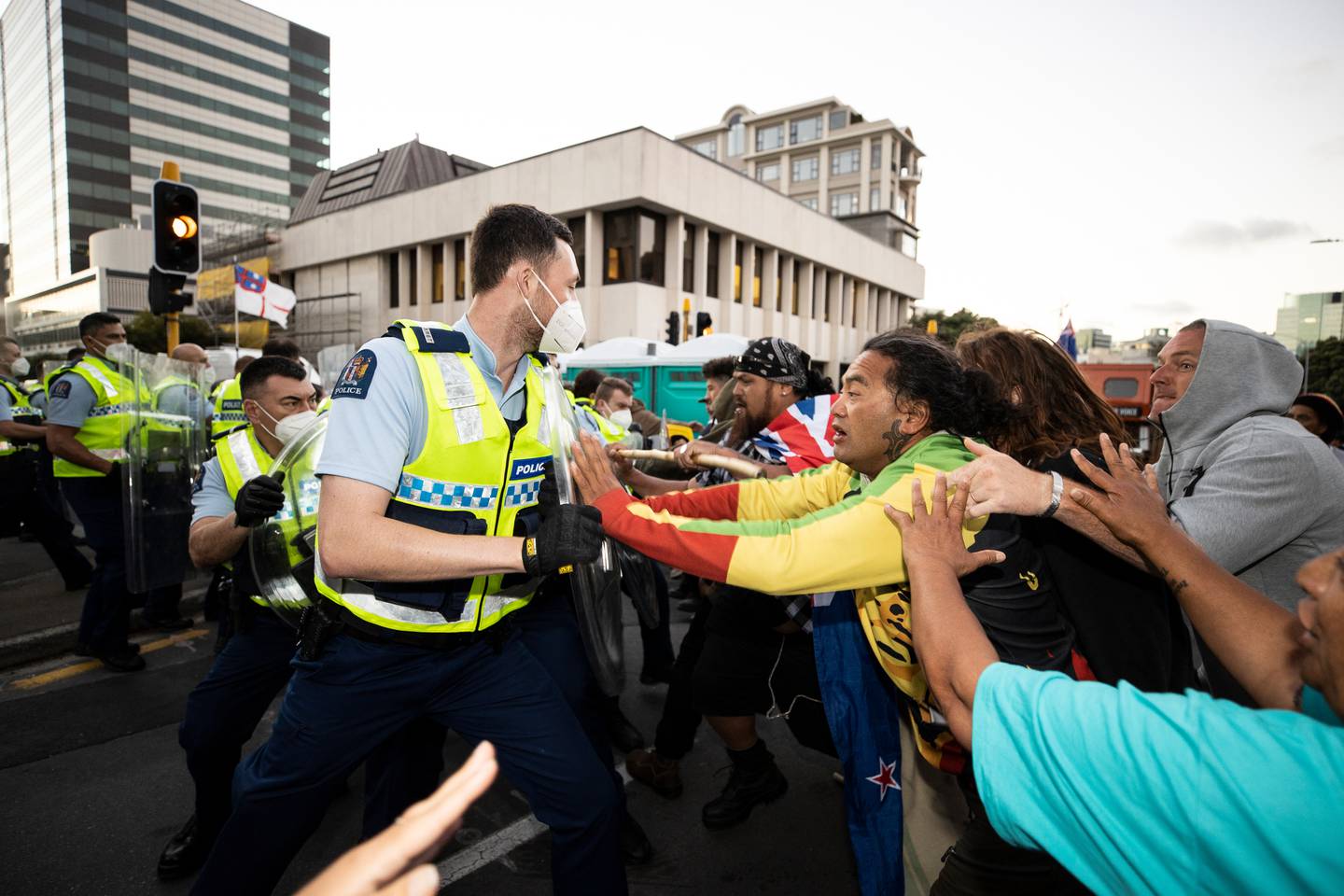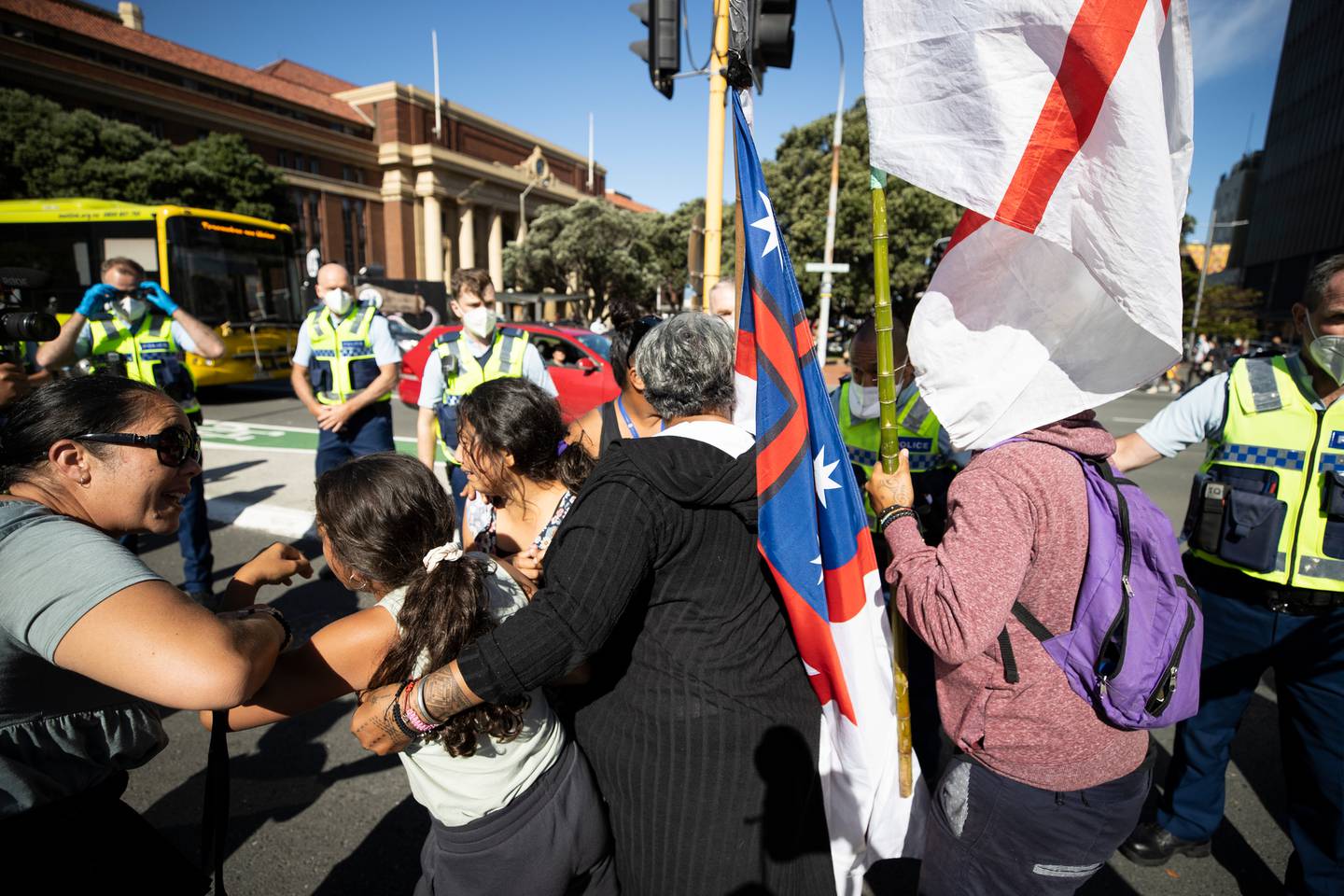
Her parents, who acknowledge the risk of bringing children to a protest, don't blame the police on the frontline but want more accountability from those in charge.
The police, however, are reinforcing their call to keep children away from the occupation zone, in which about 30 children resided as of Friday.
Parents Joseph and Lawata Coote travelled from Dunedin to the Parliament protest in Wellington on February 14, along with children Zalandra-Mali (9) and Tane (5).
On Friday afternoon, police - some in riot gear - charged into the occupation zone on Bunny St where the Coote family had parked up.
More than 100 officers had been tasked with securing the area before moving some of the concrete blocks that bordered much of the protest area and stopped more protesters from entering.
At the time, Zalandra-Mali had been playing with other children who were also at the protest with their families.
Officers with riot shields and helmets entered Bunny St and formed a line, cutting off some protesters from accessing the rest of the occupied area. Another line of police formed behind them.
Police claim the use of riot shields is to protect their staff after incidents of human waste being thrown at officers.
However, police did use riot gear to charge through protesters on Tuesday morning, sparking the most violent scenes at the protest so far - now in its 21st day.
Zalandra-Mali described to The New Zealand Herald how scary Friday's incident had been for her and her friends.
"The police were pushing us together and we were squeezed in and it was starting to hurt."
She said police soon let the children leave the area, which was filling with protesters.
Lawata saw her daughter's distress but could do little to comfort her as police wouldn't let her through.
"I saw my daughter and the other kids crying, traumatised at the events because they were trying to get out, but they were being stopped," she said.
"I was saying, 'There's my daughter, can I go see my daughter', and I could see they were crying because they were obviously scared but [the officer] put the shield up against my face and he said, 'No I've already let two people out'.
"I was angry and upset because I couldn't even go over to support her and say, 'It's alright', or even walk her across [the road] so she's not in the crossfire."

They gathered outside the Railway Building where the shock of the incident set in as many children began crying and calling for their parents.
One of Zalandra-Mali's friends succumbed to what appeared to be a panic attack.
Paramedics, who were on-site in conjunction with police, did offer support to the children.
Asked how she felt a day after the incident, Zalandra-Mali said she was still "a bit scared".
Joseph, Zalandra-Mali's father, did acknowledge there was some level of risk at protests but he felt it was important to promote freedom of expression to his children.
"We look at it as a chance for them to stand for their rights."
He said he had no grudge against the officers involved in Friday's incident.
"I see police as people, they have to do a job."
Joseph cited many instances during his time in Wellington when officers had treated protesters with respect, a relationship he hoped would grow.
He wanted to see those planning police activity at the protest to take more accountability.
"My message to the people who make the decisions is, 'Who are you', and are they willing to put their name out there and take responsibility for the actions of police if they say it's justifiable."
Despite what had happened, Joseph said the family would work hard to promote respect for police within their children.
"If we all work together, I think their opinion of the police is going to be positive.
"At the moment, it's very negative, it was traumatising for them."
A police spokesperson reiterated their position that children shouldn't be at the protest.
"It is not a safe environment for families or children due to the deteriorating sanitary conditions, increasingly aggressive behaviour from some protesters, and key protest leaders having less influence over all protest groups."
A police statement on Friday said there was about 30 children at the protest; however, overall protester numbers had dwindled since then.
The statement said police were working with Oranga Tamariki to ensure children were "at the forefront of planning and response decisions".
The police spokesperson believed officers had acted appropriately throughout the protest.
"This is an extremely difficult working environment for our frontline staff.
"However, police have been exercising their powers fairly and professionally, and have used force proportionate and relevant to the circumstances.
"Images and videos often do not provide the full context of the protest activity and the complex situations police staff face."












